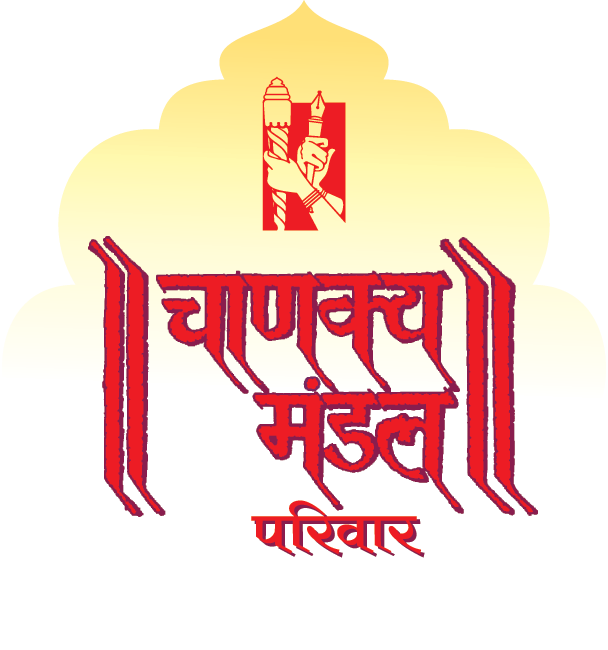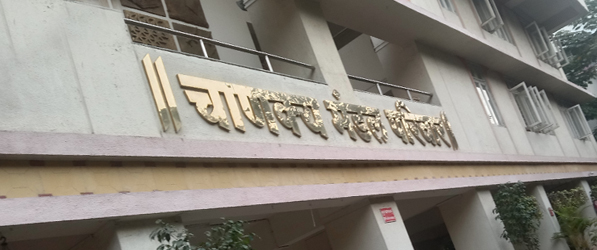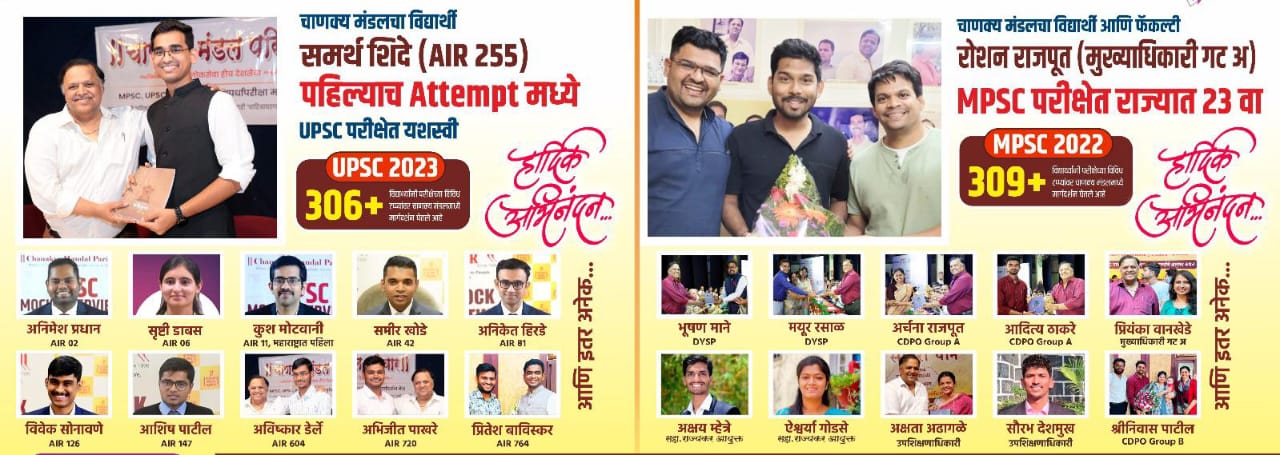Why “Chanakya”?
Arya Chanakya: Perhaps the pioneering prime bureaucrat- scholar. The thinker who realized the dangers of foreign invasion. Chanakya Mandal Pariwar has tried to awaken a corrupt exploitative, anti-people and inefficient regime. When the power-drunk corrupt regime refused to wake up, he sacrificed his career, went into wilderness organized and inspired the young generation from the commonest of the common strata of society.
He affected the political revolution which unified India and repulsed the foreign invasion. Having achieved all this he renounced all positions of power and wrote the eternal treatise ‘Artha Shastra’.
नृविज्ञान / ANTHROPOLOGY
प्रश्न–पत्र I / Paper I
निर्धारित समय: तीन घंट अधिकतम अंक : 250
Time Allowed: Three Hours Maximum Marks: 250
प्रश्न–पत्र सम्बन्धी विशेष अनुदेश
कृपया प्रश्नों के उत्तर देने से पूर्व निम्नलिखित प्रत्येक अनुदेश को ध्यानपूर्वक पढ़ें :
इसमें आठ प्रश्न हैं जो दो खण्डों में विभाजित हैं तथा हिन्दी और अंग्रेज़ी दोनों में छपे हुए हैं।
परीक्षार्थी को कुल पाँच प्रश्नों के उत्तर देने हैं।
प्रश्न संख्या 1 और 5 अनिवार्य हैं तथा बाकी प्रश्नों में से प्रत्येक खण्ड से कम–से–कम एक प्रश्न चुनकर किन्हीं तीन प्रश्नों के उत्तर दीजिए ।
प्रत्येक प्रश्न/भाग के अंक उसके सामने दिए गए हैं।
प्रश्नों के उत्तर उसी माध्यम में लिखे जाने चाहिए जिसका उल्लेख आपके प्रवेश–पत्र में किया गया है, और इस माध्यम का स्पष्ट उल्लेख प्रश्न–सह– उत्तर (क्यू.सी.ए.) पुस्तिका के मुख–पृष्ठ पर अंकित निर्दिष्ट स्थान पर किया जाना चाहिए । प्राधिकृत माध्यम के अतिरिक्त अन्य किसी माध्यम में लिखे गए उत्तर पर कोई अंक नहीं मिलेंगे। प्रश्नों में शब्द सीमा, जहाँ विनिर्दिष्ट है, का अनुसरण किया जाना चाहिए ।
प्रश्नों के उत्तरों की गणना क्रमानुसार की जाएगी। यदि काटा नहीं हो, तो प्रश्न के उत्तर की गणना की जाएगी चाहे वह उत्तर अंशतः दिया गया हो । प्रश्न–सह– उत्तर (क्यू.सी.ए.) पुस्तिका में खाली छोड़ा हुआ पृष्ठ या उसके अंश को स्पष्ट रूप से काटा जाना चाहिए ।
Question Paper Specific Instructions
Please read each of the following instructions carefully before attempting questions:
There are EIGHT questions divided in TWO SECTIONS and printed both in HINDI and in
ENGLISH.
Candidate has to attempt FIVE questions in all.
Questions no. 1 and 5 are compulsory and out of the remaining, any THREE are to be attempted choosing at least ONE question from each section.
The number of marks carried by a question /part is indicated against it.
Answers must be written in the medium authorized in the Admission Certificate which must be stated clearly on the cover of this Question-cum-Answer (QCA) Booklet in the space provided. No marks will be given for answers written in a medium other than the authorized one.
Word limit in questions, wherever specified, should be adhered to. Attempts of questions shall be counted in sequential order. Unless struck off, attempt of a question shall be counted even if attempted partly. Any page or portion of the page left blank in the Question-cum-Answer (QCA) Booklet must be clearly struck off
खण्ड A
SECTION A
Q1. निम्नलिखित पर लगभग 150 शब्दों (प्रत्येक) में टिप्पणियाँ लिखिए: 10×5=50
Write notes on the following in about 150 words each:
(a) सामाजिक तथा सांस्कृतिक मानवविज्ञान का विस्तार एवं प्रासंगिकता
Scope and relevance of Social and Cultural Anthropology 10
(b) लौह–युग का सांस्कृतिक प्रभाव
Cultural impact of Iron Age 10
(c) नस्ल तथा नृजातीयता
Race and Ethnicity 10
(d) प्रथागत कानून एवं पर्यावरणीय संरक्षण
Customary laws and Environmental conservation
(e) जीन प्रकटन
Gene expression 10
Q2. (a) दक्षिण तथा पूर्वी अफ्रीका से खोजी गई प्रमुख ऑस्ट्रेलोपिथिकस प्रजातियों की विवेचना कीजिए। टाउन्ग शिशु की खोज, शारीरिक लक्षण एवं महत्त्व का वर्णन कीजिए ।
Discuss major species of Australopithecus discovered from South and East Africa. Describe the discovery, physical features and significance of Taung baby. 20
(b) भारत के विशेष संदर्भ में उपलब्ध साक्ष्यों के आलोक में पुरापाषाण पर्यावरण की विवेचना कीजिए ।
Discuss the Paleolithic environment in light of available evidences with special reference to India. 20
(c) विभिन्न प्रकार के कुपोषण को स्पष्ट कीजिए। उपयुक्त उदाहरणों सहित प्रोटीन–कैलोरी कुपोषण का विवरण प्रस्तुत कीजिए ।
Elucidate the different forms of malnutrition. Describe protein-calorie malnutrition with suitable examples. 15
Q3. (a) मानवीकरण प्रक्रिया क्या होती है ? उपयुक्त उदाहरणों एवं चित्रों की सहायता से मानव उद्विकास की प्रमुख प्रवृत्तियों की विवेचना कीजिए ।
What is hominization process? Discuss the major trends in human evolution with the help of suitable examples and illustrations. 20
(b) क्लिफर्ड गीज़ ने धर्म को किस तरह देखा ? धर्म के अध्ययन में मानवशास्त्रीय तथा मनोवैज्ञानिक दृष्टिकोणों में अन्तर स्पष्ट कीजिए ।
How did Clifford Geertz look at religion? Differentiate between anthropological and psychological approaches to the study of religion. 15
(c) मानव वृद्धि के अध्ययन में मिश्रित अनुदैर्ध्य प्रविधि क्या होती है ? इसके गुण एवं दोषों की विवेचना कीजिए ।
What is mixed-longitudinal method of studying human growth? Discuss its merits and demerits. 15
Q4. (a) भारत में परम्परागत समाजों की सामाजिक एकजुटता को सुदृढ़ बनाने हेतु विवाह अधिनियमों की भूमिका की विवेचना कीजिए ।
Discuss the role of marriage regulations in traditional societies in India for strengthening social solidarity. 15
(b) कंकालीय अवशेषों पर आधारित व्यक्तिगत शिनाख्त की विभिन्न प्रविधियों की विवेचना कीजिए
। Discuss various methods of personal identification based on skeletal remains. 15
(C) भारत के विशेष संदर्भ में प्रमुख मध्यपाषाणकालीन स्थलों की पहचान कीजिए तथा इनके प्ररूप–प्रौद्योगिकीय लक्षणों का विवरण प्रस्तुत कीजिए ।
Identify the major Mesolithic sites and describe the typo-technological features with special reference to India. 15
खण्ड B
SECTION B
Q5. निम्नलिखित पर लगभग 150 शब्दों (प्रत्येक) में टिप्पणियाँ लिखिए: Write notes on the following in about 150 words each : 10×5= 50
(a) बहुजीनी वंशागति
Polygenic Inheritance
(b) राखीगढ़ी का प्रागैतिहासिक महत्त्व
Prehistoric significance of Rakhigarhi
(c) भाषाकालक्रमविज्ञान
Glottochronology
(d) रजोनिवृत्ति के लक्षण
Menopausal symptoms
(e) विलियम ऑगबर्न एवं सांस्कृतिक अन्तराल
William Ogburn and Cultural lag
Q6. (a) ब्रॉनिस्लॉ मैलिनोवस्की तथा मार्केट मीड के क्षेत्रीय कार्यों से संबंधित विवादों की समालोचनात्मक विवेचना कीजिए ।
Critically discuss the controversies related to fieldwork of Bronislaw Malinowski and Margaret Mead. 20
(b) देशज समुदायों की आर्थिक व्यवस्थाओं पर वैश्वीकरण के प्रभाव की विवेचना कीजिए ।
Discuss the impact of globalization on the economic systems of indigenous communities. 15
(c) वर्तमान परिदृश्य में डीएनए प्रौद्योगिकी के व्यावहारिक अनुप्रयोगों का विवरण प्रस्तुत कीजिए ।।
Describe the practical applications of DNA technology in the current scenario. 15
Q7. (a)गुणात्मक डेटा विश्लेषण की विभिन्न प्रविधियों का विवरण प्रस्तुत कीजिए । गुणात्मक विश्लेषण में प्रयोग आने वाले कुछ लोकप्रिय कंप्यूटर सॉफ्टवेयरों को इंगित कीजिए ।
Describe various methods of qualitative data analysis. Highlight some popular computer softwares used in qualitative analysis. 20
(b) किसी जनसमूह के आनुवंशिक संतुलन में बने रहने हेतु किन धारणाओं का पूरा होना आवश्यक है ? आनुवंशिक संतुलन के महत्त्व को स्पष्ट कीजिए ।
What assumptions must be met for a population to be in genetic equilibrium? Explain the importance of genetic equilibrium. 15
(c) राष्ट्रीय चरित्र अध्ययनों के राजनीतिक एवं विधितंत्रीय पक्षों की विवेचना कीजिए । ऐसे अध्ययनों की समसामयिक प्रासंगिकता को स्पष्ट कीजिए ।
Discuss political and methodological aspects of national character studies. Elucidate the contemporary relevance of such studies. 15
Q8. (a) अर्जुन अप्पादुरै द्वारा प्रतिपादित वैश्विक सांस्कृतिक अर्थव्यवस्था की अवधारणा का समालोचनात्मक परीक्षण कीजिए ।
Critically examine Arjun Appadurai’s conceptualization of global cultural economy. 20
(b) गुणसूत्रों की संरचनात्मक विकृतियों के कारकों का उपयुक्त उदाहरणों सहित विवरण प्रस्तुत कीजिए ।
Describe the causes of structural abnormalities of chromosomes with suitable examples. 15
(c) नातेदारी अध्ययनों में ए. एल. क्रोएबर के योगदान की समालोचनात्मक विवेचना कीजिए ।
Critically discuss A.L. Kroeber’s contribution to kinship studies. 15
 CTS
CTS  Donate
Donate 


